In searching for a graphic for Richard Weitz’s WPR column on the Afghanistan parliamentary elections, Kari stumbled across this photo, from the USAID flickr stream, of three Burqa-clad Afghan women giving the inked finger to the camera. My immediate reaction was to recoil, with a sense of shock that in 2010, this is a sign of progress for U.S. foreign and security policy in the world. Voting is good, but it implies a respect for the subjectivity and personhood of each individual citizen that the burqa, in my limited understanding of it, denies. My subsequent thought went to the current […]
Latest Archive
Free Newsletter
With international attention overwhelmingly focused on Iran’s nuclear program and its ultimate objectives, the country’s conventional weapons capability often goes unexamined. In an e-mail interview, Anoush Ehteshami, professor of international relations at Durham University’s School of Government and International Affairs, discusses Iran’s conventional weapons capability. WPR: What conventional weapons capability does Iran currently have, and how much does it devote to defense spending? Anoush Ehteshami: Iran’s conventional weapons capability has gone through a revolution since 1979 and the subsequent severance of ties with the U.S. and other Western militaries. The eight-year-long Iran-Iraq war had the most direct impact, in terms […]
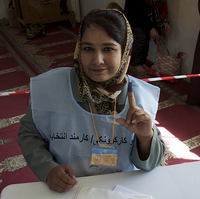
The results of the Sept. 18 elections to the Wolesi Jirga, Afghanistan’s lower house of parliament, will not be known for weeks, but from the point of view of the international community, in many ways the process is more important than the outcome. The strategy adopted by the Obama administration, NATO, and the other key international players in Afghanistan depends for success on establishing Afghan political, economic, and military institutions that are strong and legitimate. Without an effective Afghan partner able to reduce the threat from the Taliban insurgents to manageable levels, the coalition’s counterinsurgency strategy will never succeed. But […]
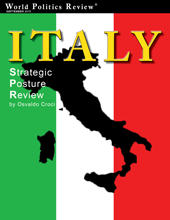
The main external influence on a state’s foreign and security policies is the structure of the international system. Prudent states act within the constraints determined by both the distribution of power in the system and their own position in it. As the international system changes, so, too, do its systemic constraints, with national foreign and security policies also likely to undergo changes as a result. Other factors determining the type of security policies a state adopts include national security culture as well as state capacity. In line with this theoretical approach, this review will discuss how the changing systemic constraints […]
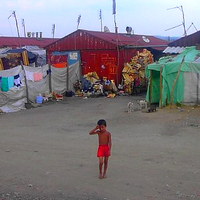
Last week, the controversy over France’s expulsions of illegal Roma immigrants reached a peak, when EU Justice Commissioner Viviane Reding implicitly compared the policy to those of Nazi Germany. Calling for legal action against France, Reding said, “Discrimination on the basis of ethnic origin or race has no place in Europe,” adding, “I thought Europe would not have to witness [this] again after the Second World War.” Reding’s remarks came after French media leaked an internal Interior Ministry memo from early August ordering the dismantling of 300 camps, with the Roma settlements singled out as “priority.” The French government had […]
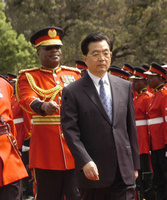
When Europe ran the world, trade followed the flag, meaning that globalization in its initial expression — otherwise known as colonialism — grew out of the barrel of a gun, to paraphrase Mao Zedong. On this subject, Franklin Roosevelt and Vladimir Lenin agreed, even if that conclusion led them to embrace diametrically opposed strategies: FDR’s realization that “the colonial system means war” drove him to erect an international liberal trade order following World War II that doomed the vast colonial systems of his closest European allies. Roosevelt’s success not only enabled America to contain and ultimately defeat the soul-crushing Soviet […]
With the Great Euro Panic of 2010 drawing to a close and the Great Post-Lisbon Hype long since put to bed, the season for sober analysis of the EU’s malaise is upon us, and Henry Farrell’s insightful essay (via Art Goldhammer) doesn’t disappoint. What I like most is Farrell’s observation that, if the EU is in desperate need of a new raison d’être, it’s not due to some inherent weakness or shortcoming. Rather, it’s in part because its original rationale has been a victim of the union’s success at home, and in part because the union’s alternative model of peaceful […]
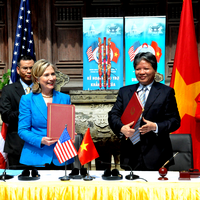
Nuclear energy’s recent renaissance has seen the United States firm up nuclear cooperation agreements with a number of emerging nuclear nations. However the most eye-catching so far is the proposed deal with Vietnam, which stands out not only for its departure from the standard template of such deals, as epitomized by the U.S.-UAE nuclear agreement, but also because it comes at a time when Sino-American interests have been at odds in the South China Sea. More broadly, the deal reflects the unfolding American strategy to counter Chinese assertiveness in the Asia-Pacific region. Nonproliferation hawks are up in arms that the […]
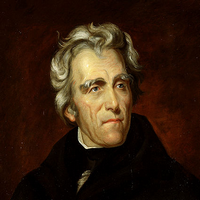
A great deal of ink has been spilled on the domestic trajectory of the “Tea Party” movement, which is demonstrating its growing clout within the ranks of the Republican party and could end up playing a decisive factor in the 2010 midterm congressional elections. But less attention has been given to the foreign policy implications of the Tea Party’s possible ascendancy. Even if the Republicans take back control of both houses of Congress this fall, the Tea Party is unlikely to play a major role in shaping U.S. foreign policy. However, its perspective will shape popular perception, and its counsel […]
I had the pleasure of participating in a France 24 panel discussion program on Monday, but which was just posted online yesterday. The subject was Turkey’s role in the Middle East and its EU accession prospects in the aftermath of last Sunday’s referendum. Part one can be found here. Part two can be found here. This was another one where I managed to express everything I had in mind. I might have added my “Turkey as Rorschach test” theory, whereby what analysts say about Turkey reveals more about them than about Turkey. But I think it comes across in the […]
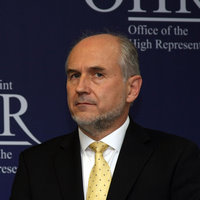
This past spring, the international community put discussions about the future of Bosnia, a country crippled by institutional dysfunction, on ice until after the upcoming elections on Oct. 3. But even should the election’s winners have the will to address the gridlock that blocks effective governance, they will not have the power. The best that can be hoped for is that the country’s profound political frustrations continue to be expressed peacefully. The internationally brokered Dayton Accords brought an end to the Bosnian civil war in 1995 and subsequently safeguarded the political prerogatives of the country’s Serb and Croat minorities in […]
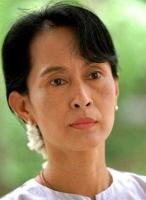
With little more than 50 days left until elections on Nov. 7, tensions are rising noticeably in Burma — the country renamed Myanmar by its military rulers. The junta that keeps the country in its steely grip is trying to make sure the election goes off exactly as planned — which is to say, without triggering a new revolt, let alone a full-fledged revolution, and without producing an electoral outcome that would embarrass the regime or weaken its hold on power. The regime is so nervous that it recently ordered the temporary suspension of the magazine Modern Times as punishment […]
I just wanted to flag two thought-provoking articles on the strategic shifts associated with China’s rise, which I’ve taken to calling, “The Great Asia Rebalancing.” The first is by Hugh White (excerpted from a longer essay here), the second by Michael Clarke. Together, they offer fascinating insights into the strategic choices faced by two historic U.S. allies, both of whom face very real constraints on their ability to keep up with the dramatic changes shaping the global security environment. Clarke notes that with the end of any real security threat either originating from or menacing Europe, the U.S. has effectively […]
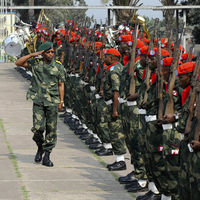
KINSHASA, Congo — The local residents had been waiting for hours, and there was no guarantee they’d get in to the poorly lit room where administrators from the Forces Armées de la République Democratique du Congo (FARDC) were busy filling out paperwork. The U.S. Army and the FARDC were trying to register the Congolese civilians for a free health clinic that would take place the following week. The clinic, administered by military medical personnel from both countries, would be one of the culminating events of a two-week, U.S.-led exercise meant to improve the FARDC’s medical capabilities — all part of […]
Thought a political settlement to the insurgency in Afghanistan was going to be hard to come by? Should be a cakewalk compared to negotiating a ceasefire to the firefight that’s been going on this week between the authors of the Afghanistan Study Group report and its critics. But since I hate to see people I like and whose work I admire engaged in such a bitter argument, I’ll give it a try. The initial withering assault by Joshua Foust can be found here, as well as more constructive criticism from Michael Cohen here, and Andrew Exum here. This follow-up post […]
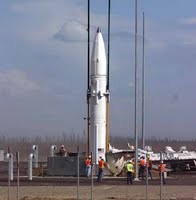
Critics of the New START treaty charge that, if ratified, it would constrain U.S. missile defense plans. Whether or not the treaty’s non-binding preamble supports their argument, the broader question regarding the future of missile defense is an important one. Missile defenses bolster deterrence and strengthen the security of U.S. allies, giving them a significant role to play in a fluid and dynamic contemporary security environment. But regardless of the New START treaty, the Obama administration will have to limit U.S. missile defense plans if it wishes to remain credibly committed to future arms reduction agreements with Russia, as well […]
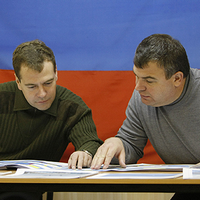
When Russian Defense Minister Anatoly Serdyukov meets with U.S. Secretary of Defense Robert Gates at the Pentagon tomorrow, they will have a lot to discuss. Although Serdyukov has been defense minister since 2007, this will be his first official visit to the Pentagon. That’s primarily because he has focused his attention back home, implementing the most comprehensive reform of the Russian military in almost a century. Indeed, Pentagon spokesman Geoff Morrell noted last week that Gates and Serdyukov “are both taking on very bold, very ambitious reform initiatives within their respective militaries, and I think they want to talk about […]
